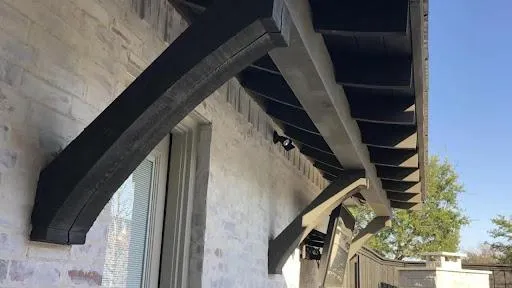BLOGS
Texas Woodpeckers LLC Blogs & Articles

Does A Home Addition Increase Home Value?
Yes, a home addition can increase a home's value, typically recouping about 50-60% of its cost according to the Remodeling 2023 Cost vs. Value Report. However, the extent of the increase depends on factors such as the type of addition, the quality of work, neighborhood compatibility, and local market conditions.
In a competitive real estate market, a well-planned and executed home addition can offer an appealing return on investment (ROI) while improving your quality of life. However, understanding the nuances behind how much value a home addition can add is crucial for making informed decisions.
In this article, we’ll explore the various factors that influence home value, focusing on why adding space to your home could be a worthwhile investment. Whether you're considering a kitchen addition, bathroom remodel, or a family room extension, Texas Woodpeckers is here to guide you through the journey.
Key Takeaways
Return on Investment (ROI): Expect to recoup approximately 50-60% of your investment from home additions.
Type of Addition Matters: Different projects yield different returns, with kitchen and bathroom additions generally offering solid ROI.
Quality is Key: High-quality craftsmanship enhances the overall value, while poorly executed projects can detract from it.
Market Conditions: A strong seller's market can improve ROI, while a slower market may limit potential gains.
Neighborhood Compatibility: Ensure your addition fits well within the context of your neighborhood to avoid over-improving.
Maximizing Your Home Addition: Key Factors for Boosting ROI and Value
Return on Investment (ROI)
When considering a home addition, understanding the potential return on investment (ROI) is crucial. On average, homeowners can expect to recoup approximately 50-60% of their investment through increased property value. This return can vary based on several factors, including the type of addition and execution quality. It's essential to keep your goals in mind and plan wisely to maximize your ROI.
Average ROI: 50-60%
Example: A $300,000 addition might increase home value by about $180,000.
Higher ROI in strong real estate markets.
Type of Home Addition Matters
The type of home addition you choose significantly impacts its potential return. Certain projects consistently yield higher returns, making them more appealing for homeowners looking to invest wisely. Understanding which additions are most valuable can help guide your decision-making process.
Kitchen and bathroom additions typically offer solid ROI.
Sunroom and family room additions also enhance value.
Midrange primary suite additions can have varying returns.
Quality is Key
The quality of craftsmanship plays a vital role in determining the overall value added by a home addition. High-quality construction not only enhances the aesthetic appeal but also contributes to the longevity and functionality of the space. Conversely, poorly executed projects can detract from a home’s value and lead to costly repairs down the line.
Well-executed additions enhance property value.
Poor craftsmanship can reduce appeal and value.
Attention to detail is essential for long-lasting results.
Market Conditions
Real estate market conditions significantly influence the ROI of home additions. In a robust seller's market, homeowners may see a higher return on their investment, while a slower market can limit potential gains. Being aware of local trends can help you make informed decisions about the timing and type of addition you choose.
Strong markets often yield better ROI.
Slower markets may see limited value increase.
Local market trends should guide your addition plans.
Neighborhood Compatibility
Before embarking on a home addition, consider how it fits within the context of your neighborhood. Over-improving your home compared to others in the area can negatively impact its value. Striking a balance between personal preference and neighborhood standards is key to ensuring your addition is a worthwhile investment.
Ensure additions align with neighborhood styles.
Over-improving can lead to diminished returns.
Consider average home sizes and styles in the area.
Frequently Asked Questions About Home Additions
1. What types of home additions are most valuable?
Kitchen and bathroom additions typically offer solid ROI, while sunroom and family room additions can also enhance value.
2. How long does a home addition take?
The timeline varies based on the complexity of the project, but most home additions take several weeks to a few months to complete.
3. What permits do I need for a home addition?
You'll need to check local regulations, but common permits include building, electrical, and plumbing permits.
4. Can I finance a home addition?
Yes, many homeowners finance additions through home equity loans, personal loans, or specific renovation loans.
5. How do I choose the right contractor for my addition?
Look for contractors with experience, solid reviews, and a portfolio of completed projects. Consult with Texas Woodpeckers for expert guidance.
Enhancing Your Home Value With Texas Woodpeckers Now!
In summary, investing in home additions can significantly enhance your property value, but it's essential to consider the type of addition, quality of work, and local market dynamics. By understanding these factors, homeowners can maximize their enjoyment and financial returns from their investments.
If you're contemplating a home addition, Texas Woodpeckers is ready to assist you in crafting a space that reflects your lifestyle and adds value to your home. Contact us now for a free quote and let our dedicated team transform your vision into reality. Your dream home is just a call away!
Contact Our Construction Company in Carrollton, TX
Ready to begin your next project? Contact Texas Woodpeckers today to schedule a consultation. We’re here to help bring your vision to life with our dedicated team, high-quality materials, and excellent service.
Working Hours
Monday: 8.00am – 5.00pm
Tuesday: 8.00am – 5.00pm
Wednesday: 8.00am – 5.00pm
Thursday: 8.00am – 5.00pm
Friday: 8.00am – 5.00pm
Saturday: 8.00am – 5.00pm
Sunday: Closed
Fully Insured and Licensed
10+ Years of Experience
Free Estimate
We Speak English & Spanish
We Accept Cash, Cards & Checks
Residential and Commercial Services
Copyright © 2025 Texas Woodpeckers LLC. All Rights Reserved. Privacy Policy. Terms & Conditions.
